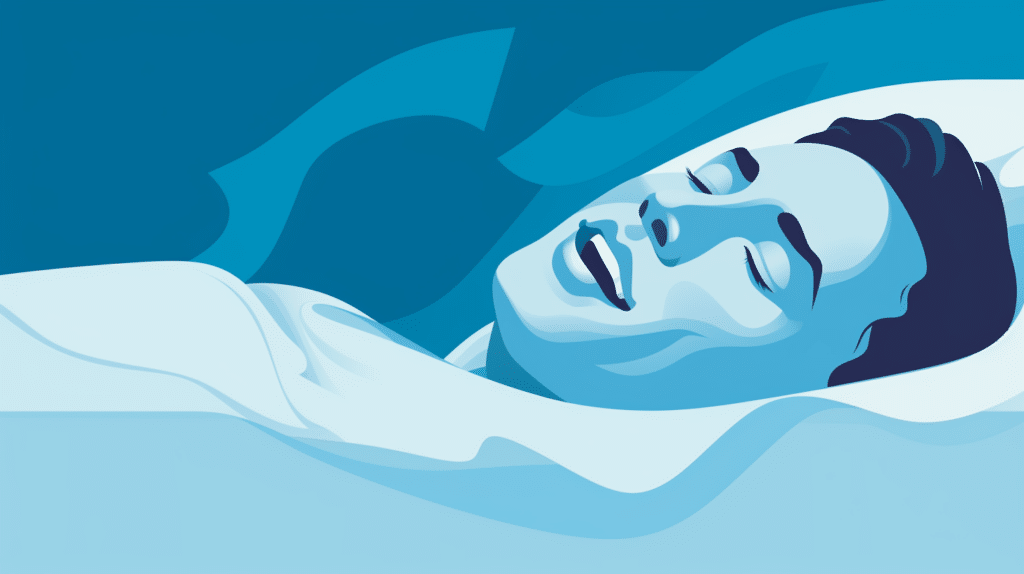Last Updated on August 3, 2023
Biting one’s tongue during sleep can be a bothersome and painful situation. Many people experience this at least once in their lives, and it often arises unexpectedly. A variety of factors can contribute to this problem, including sleep disorders, oral habits, and even certain medications. Understanding the causes and potential complications of this issue is essential for proper evaluation and treatment.
Sleep bruxism, one of the possible causes, involves grinding and clenching of teeth during sleep. This, together with other oral habits such as nail biting or tongue pushing, influences the likelihood of tongue biting during sleep. Symptoms of tongue biting may involve pain, swelling, or even recurrent tongue injuries if left unaddressed. Furthermore, factors like stress, lifestyle habits, and pre-existing medical conditions can increase the risk of experiencing tongue biting during sleep. Therefore, seeking professional help for diagnosis and appropriate treatment is crucial in preventing further complications and ensuring a good night’s sleep.
Key Takeaways
- Biting tongue in sleep can be caused by various factors, including sleep disorders and oral habits.
- Consequences may range from mild pain to recurrent tongue injuries if left untreated.
- Consultation with a healthcare professional is essential for diagnosis and implementing effective prevention strategies.
Causes of Biting Tongue in Sleep
Sleep Bruxism
Sleep bruxism, commonly known as teeth grinding or clenching, can lead to tongue biting during sleep. This condition can be triggered by factors such as stress, anxiety, smoking, or tension. Sleep bruxism can cause pain in the jaw, headaches, tooth pain, and soreness, as well as tongue injury, resulting in bleeding or cuts on the tongue. To manage this condition and prevent further injury, a night guard might be recommended by a healthcare professional.
Nocturnal Seizures
Nocturnal seizures, or nighttime seizures, are epileptic seizures that occur during sleep. These seizures can cause involuntary muscle spasms, leading to biting the tongue in sleep. Individuals who experience this condition may experience headaches, sore jaw, or scalloping on the tongue edges. An appointment with a healthcare professional is essential for proper diagnosis and management of epilepsy.
Sleep Apnea
Sleep apnea, a sleep-related disorder, can cause snoring, pauses in breathing, and facial muscle spasms. The repeated interruptions in breathing may lead to bodily reflexes, such as tongue biting in sleep. If left untreated, sleep apnea can contribute to issues with concentration and additional health concerns. Medical intervention may be required to manage sleep apnea and prevent tongue injury.
Rhythmic Movement Disorder
Rhythmic movement disorder (RMD) is another sleep-related movement disorder that may lead to tongue biting in sleep. RMD can cause involuntary body movements and muscle spasms, resulting in accidental tongue biting, cheek biting, and tongue pain. If suspected, a healthcare professional should be consulted for appropriate diagnosis and treatment options.
In summary, various conditions can cause tongue biting during sleep, such as sleep bruxism, nocturnal seizures, sleep apnea, and rhythmic movement disorder. It is essential to consult a healthcare professional for proper diagnosis and management of these conditions to prevent further injury and complications.
Symptoms and Complications
Biting one’s tongue during sleep can lead to several symptoms and complications, some of which may require medical attention.
Tongue Soreness and Ulcers
One common symptom of frequent tongue biting is tongue soreness. The repeated pressure and damage to the tongue can cause painful sensations, making it difficult to speak or eat. In some cases, this can even lead to the development of tongue ulcers. Ulcers are open sores that can occur on the tongue, causing discomfort and sometimes bleeding. They often develop as a result of:
- Repeated biting
- Sharp teeth or dental restorations
- Stress or anxiety
Practising relaxation techniques, such as deep breathing, meditation or yoga, can help reduce stress and potentially decrease the frequency of tongue biting.
Infections
Open wounds or cuts on the tongue caused by biting can become susceptible to bacterial infections. In some cases, these infections can escalate into more serious conditions, such as Lyme disease or complications in the central nervous system.
Signs of infection may include:
- Redness or swelling around the wound
- Pus or discharge
- Fever or chills
- Persistent pain or discomfort
If you suspect an infection, it is important to seek medical advice promptly.
Injuries
Tongue biting can lead to various types of injuries, including tongue bleeding and cuts or marks on the tongue. These injuries can be painful and might interfere with daily activities such as eating, speaking or maintaining proper oral hygiene. Moreover, severe tongue injuries can impair the tongue’s function and even impact one’s overall oral health.
To manage tongue pain and promote healing, consider using over-the-counter pain relievers, applying ice to the affected area and rinsing your mouth with warm saltwater. Additionally, proper dental hygiene and avoiding irritants such as alcohol, tobacco and spicy foods can aid in the healing process.
Risk Factors
Biting your tongue in sleep can be caused by various factors, which can be categorised into three main sub-sections: Lifestyle Choices, Medical Conditions, and Medication Use.
Lifestyle Choices
- Stress and Anxiety: Increased stress and anxiety levels can lead to an unconscious reaction of biting the tongue during sleep. Learning stress management techniques and finding relaxation methods can help reduce the occurrence.
- Smoking: Smoking is known to disturb sleep patterns and can also be linked to an increased risk of sleep disorders, including tongue biting.
- Recreational drug use: The use of ecstasy (MDMA) and other recreational drugs can affect sleep patterns and muscular control. This may result in the unintentional biting of the tongue during sleep.
Medical Conditions
- Facial muscle spasms: Involuntary contractions of facial muscles can lead to unwanted tongue movements in sleep, increasing the chance of biting it.
- Snoring and sleep-related breathing issues: Those who snore or suffer from sleep-related breathing disorders may be more prone to bite their tongues in their sleep due to irregular muscle movements and mouth positioning.
- Trauma or surgery: Previous facial trauma or surgeries may cause changes to the mouth and jaw structure, potentially increasing the likelihood of tongue biting during sleep.
- ADHD: People with Attention Deficit Hyperactivity Disorder may be more prone to sleep disturbances, such as tongue biting, due to their heightened levels of motor activity and restlessness.
Medication Use
- Antibiotics and prescribed medications: Some medications, including certain antibiotics, can cause muscle spasms or tension that could lead to tongue biting. It is essential to discuss the side effects of prescribed medications with your medical provider.
- Medication for anxiety disorders: Some medications used to treat anxiety can alter sleep patterns or relax the muscles of the mouth, which can result in the unintended biting of the tongue. It is important to consult your doctor if you experience any negative side effects from anxiety medication.
Diagnosis and Evaluation
Physical Examination
The first step in diagnosing and evaluating tongue-biting during sleep is a thorough physical examination. A healthcare professional will inspect the oral cavity to check for any signs of tongue injury, such as cuts, bruising, or swelling. Additionally, the clinician may assess the patient’s dental health, looking for indicators like misaligned teeth or jaw that may contribute to the problem.
It is also crucial to consider any underlying medical conditions that could cause tongue-biting during sleep. Conditions such as epilepsy or sleep disorders like sleep apnea might lead to this behaviour. In such cases, addressing the primary medical issue is essential to alleviate tongue-biting symptoms.
Sleep Study
A sleep study, or polysomnography, may be recommended for a more comprehensive evaluation of tongue-biting during sleep. This assessment monitors brain activity, muscle movements, and other vital functions while the patient sleeps to identify any abnormalities.
In the context of sleep-related tongue-biting, a sleep study can help determine if the issue stems from sleep bruxism or other sleep disorders1. Sleep bruxism is characterised by teeth grinding and clenching during sleep, which can result in tongue-biting. Identifying sleep bruxism as the underlying cause can help direct appropriate treatment plans, such as dental interventions, stress management, or other behavioural therapies.
In summary, the diagnosis and evaluation of tongue-biting during sleep involve a thorough physical examination and, if necessary, a comprehensive sleep study. Identifying the root cause, whether it be an underlying medical condition or a sleep disorder, is critical in providing the appropriate intervention and management.
Treatment and Prevention
Mouthguards
One effective method for preventing tongue biting during sleep is the use of a mouthguard or night guard. These devices are custom-fitted by a dental professional based on dental impressions to ensure a comfortable and secure fit. A mouthguard not only helps protect the tongue from accidental bites but also keeps the jaws aligned, potentially reducing the risk of sleep-disordered breathing.
Behavioural Interventions
Behavioural interventions can also be beneficial in reducing tongue biting during sleep. Techniques such as relaxation exercises, mindfulness, and stress reduction may help improve sleep quality and minimize the occurrence of tongue-biting episodes. Additionally, breaking harmful oral habits like finger-sucking, nail-biting, and lip-licking may contribute to better overall oral health and reduce the chances of malocclusion.
Medications
In certain cases, medications may be necessary to address specific underlying issues contributing to tongue biting during sleep. For instance, if sleep study results indicate severe sleep-disordered breathing or sleep apnoea, your healthcare provider may prescribe medication to improve symptoms. These medications target sleep-related issues and can indirectly help reduce tongue biting incidents.
Combating Underlying Conditions
Addressing underlying health conditions that contribute to tongue biting during sleep is crucial. Conditions such as sleep apnoea, stress, and anxiety can exacerbate the problem. Treatment options range from weight loss and lifestyle changes to oral appliance therapy to treat sleep disordered breathing. Identifying and addressing these conditions can help alleviate the issue of tongue biting in sleep.
Additionally, simple home remedies like rinsing your mouth with warm salt water can help soothe any pain or discomfort from tongue injuries sustained due to biting.
Frequently Asked Questions
Why does tongue biting occur during sleep?
Tongue biting during sleep can occur due to various reasons, including abnormal muscle contractions, bruxism (teeth grinding), and certain sleep disorders. In some cases, an individual might unconsciously bite their tongue while moving their jaw during sleep. Furthermore, people with sleep apnea may experience tongue biting as their airway is obstructed, causing involuntary jaw movement.
What is the link between sleep apnoea and tongue biting?
Sleep apnoea is a sleep disorder where a person’s breathing repeatedly stops and starts during sleep. This can result in tongue biting due to the struggle to maintain an open airway. Muscle relaxation in the airway might cause the tongue to fall back, partially blocking the air passage, which leads to involuntary jaw movements and potential tongue biting.
Can anxiety cause tongue biting at night?
Anxiety can contribute to tongue biting at night as it may lead to increased muscle tension, teeth grinding, or clenching. This can result in involuntary jaw movement while sleeping, increasing the likelihood of tongue biting. Thus, addressing anxiety issues might help reduce the risk of tongue biting during sleep.
How can a mouthguard help prevent tongue biting?
A mouthguard is a custom-made device typically used to protect the teeth from grinding and clenching. By creating a barrier between the upper and lower teeth, it can help prevent tongue biting while sleeping. It keeps the jaw slightly open and prevents the tongue from being trapped between the teeth during unconscious jaw movement.
Is tongue biting related to certain types of seizures?
Tongue biting can be related to certain types of seizures, particularly nocturnal (night-time) seizures. During a seizure, a person may experience uncontrollable muscle contractions, including those in the jaw, which can lead to tongue biting. It’s important to consult a healthcare professional if you suspect that frequent tongue biting might be related to a seizure disorder.
Are there any effective treatments for frequent tongue biting while sleeping?
Effective treatments for frequent tongue biting during sleep depend on the underlying causes. For cases related to bruxism or sleep apnoea, using a mouthguard and seeking appropriate interventions for the sleep disorder can be helpful. If anxiety is a contributing factor, addressing stress management and relaxation techniques might be beneficial. In instances where tongue biting occurs due to seizure activity, proper diagnosis and treatment of the underlying seizures are necessary with the assistance of a healthcare professional.
Footnotes
- Sleep bruxism: validity of clinical research diagnostic criteria in a controlled polysomnographic study ↩
- https://www.sciencedirect.com/science/article/pii/S1389945713017577 ↩
- https://jamanetwork.com/journals/jamainternalmedicine/article-abstract/621293 ↩
- https://link.springer.com/article/10.1007/s11325-017-1489-2 ↩



